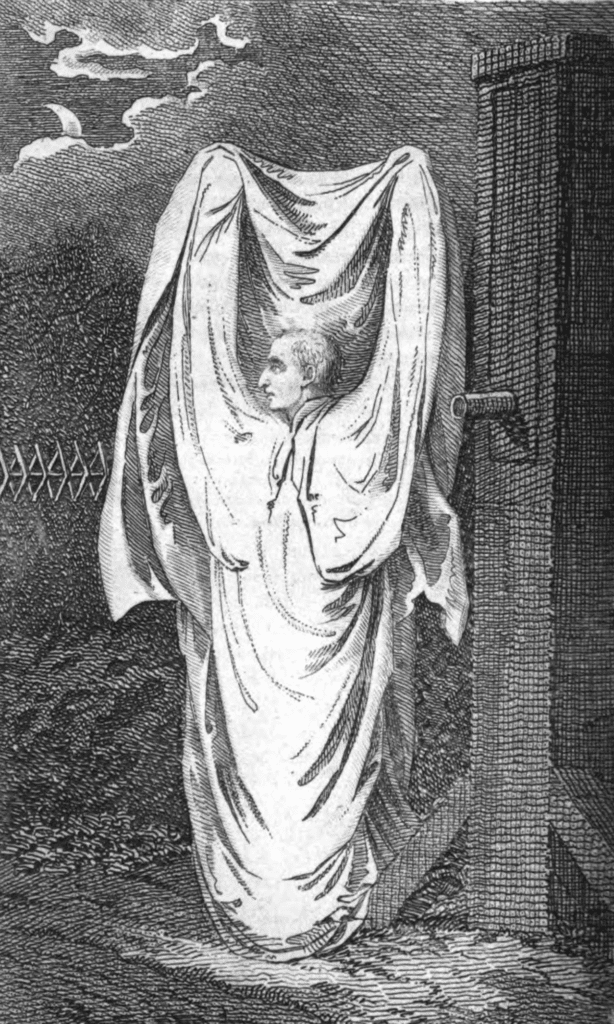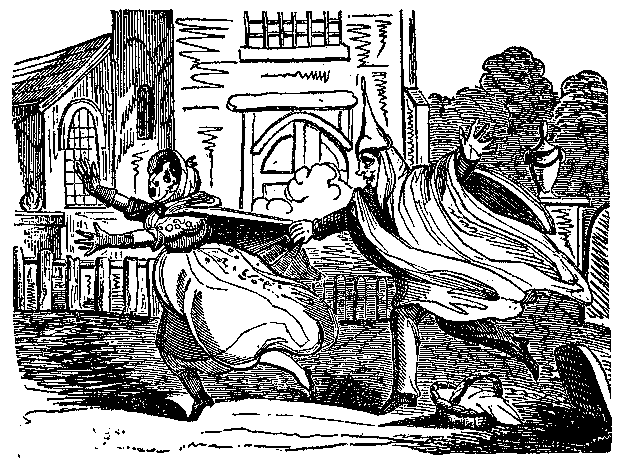Through November and December of 1803, London was seized by pure terror. The Hammersmith district had been plagued with sightings of a macabre-looking ghost. Every night, reports of a malevolent apparition flooded the police station. According to most accounts, the specter was determined to frighten anyone nearby. It was described as wearing a white shroud or calf skin and having large glassy eyes.
One of the most alarming encounters concerned an elderly woman and her younger, pregnant friend. The two women were allegedly so scared upon seeing the ghost that they died of fright in their beds a few days later. Another sighting occurred and caused a wagoner to lose control of his horses. His 16 passengers were injured. Finally, a brewer named Thomas Groom claimed to be strangled from behind while strolling through a churchyard. After grappling with his assailant, Groom turned around in time to see the ghost vanish behind a row of tombstones.

Photo Credit: Wikimedia Commons
Local speculation eventually traced the ghost to the restless spirit of a man who had slashed his own throat 12 months prior; as a suicide case, his soul was unable to rest peacefully, so the theory went. But skeptics in the village believed they were being victimized by a prankster, and quickly formed a vigilante group.
On December 29, members of the group, including night-watchman William Girdler, spotted a shrouded figure lurking about the area. The group gave chase; halfway into their pursuit, the figure dropped his shroud and escaped.
Four days later, everything changed.
Thomas Millwood, a 32-year-old plasterer, was returning home along Black Lion Lane on the evening of January 3, 1804. Having just come from his parents’ home, Millwood was still wearing his white work clothes: an apron, waistcoat, and trousers. One of the vigilantes named Francis Smith spotted Millwood and immediately shouted: “Damn you. Who are you and what do you want? I’ll shoot you if you don’t speak!” Without waiting for a response, Smith fired two gunshots, one of which hit Millwood in the face and killed him instantly.
Hearing the shots from her house, Anne Millwood called out her brother’s name in the street but did not get an answer. She ran into the direction of Black Lion Lane and found him sprawled across the ground, covered in blood. Once it became evident that Millwood was the victim of mistaken identity, and that Smith had fired his gun in haste, Smith surrendered to police. Millwood’s body was taken to the Black Lion Inn and examined by the local surgeon, where it was confirmed that a bullet wound to the lower left jaw and subsequent spinal damage had been the cause of death.
Two days later, a man named John Graham came forward and admitted to being the Hammersmith “ghost.” Graham stated that he had created the ruse to scare his apprentices who had been frightening his children with ghost stories. Still, his reasoning did not explain why unrelated people had been attacked. Unsure about how to deal with him, the judges granted him bail while they deliberated. No records of further legal action against Graham exist.
At a coroner’s inquest, Francis Smith was deemed responsible and sent to Newgate Prison to await trial. A week later, Smith pled not guilty despite admitting to firing the shot. Because no one had actually witnessed the shooting, there was a greater burden of proof on the prosecution. Smith compounded his plea by justifying his actions as self-defense. Several character witnesses attested to Smith’s good standing.

Photo Credit: Public Domain
Surprisingly, Millwood’s mother-in-law, Phoebe Fulbrooke testified that Millwood was aware of the Hammersmith Ghost, and that she had warned him against wearing white clothing in the street at night. She further testified that he ignored her suggestion.
After a lengthy analysis of the facts, the Lord Chief Baron leaned toward conviction. He reminded the jury that Smith was not acting in self-defense, and that the shooting was not accidental. Taking this into account, the jury found Smith guilty of manslaughter. But the Lord Chief Baron would not accept the verdict. Instead, two additional judges, Justice Rooke and Justice Lawrence, spoke to the jury and implored them to reconsider. The jury held a second meeting and subsequently found Smith guilty of murder. He was sentenced to be hanged and dissected the following Monday.
Crying hysterically, Smith collapsed and had to be carried out of the courtroom. The Lord Chief Baron, either in a moment of compassion or in recognition of the public backlash that might ensue, referred Smith’s punishment to King George III. That evening, the King commuted Smith’s death sentence to one year of imprisonment with hard labor. On July 14, 1804 he received a full pardon.
In the years that followed the Hammersmith Ghost case, similar instances of mistaken identity were brought to trial. It was determined that there was little defense for a person who committed a violent crime while actually believing they were acting in good faith. This legal haziness would not be settled until 180 years later in 1984, when Regina vs. Williams was brought to the Court of Appeal.
Though the Hammersmith Ghost and Thomas Millwood have long since disappeared from view, local legend maintains that Millwood’s spirit is not at peace. Every 50 years, his ghost is said to appear in the bar that now stands on the location of his death.
Ironically, the very man gunned down because he appeared as a ghost is now said to haunt the site where he died.
This story was first published on The Lineup
Read more below:
9 American Horror Story Characters Based on Real-Life Killers
8 Real-Life Cabin in the Woods Murders That Will Make You Lock Your Doors






